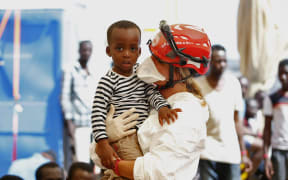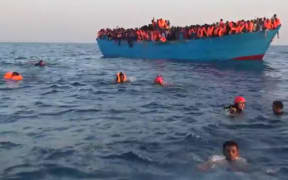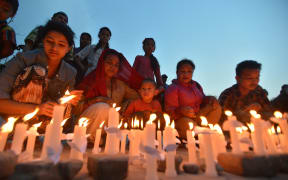First Person - This is the pointy bit. The bit where more than 100 lives hang in the balance before your eyes.
I've worked on and off for the Red Cross since 2003 in all kinds of situations - post-conflict in Sierra Leone, landslides in the Philippines and Papua New Guinea, refugee camps in Chad, earthquakes in Nepal and Christchurch, tsunamis in Southeast Asia and Samoa, and more.
This, though, this is different.
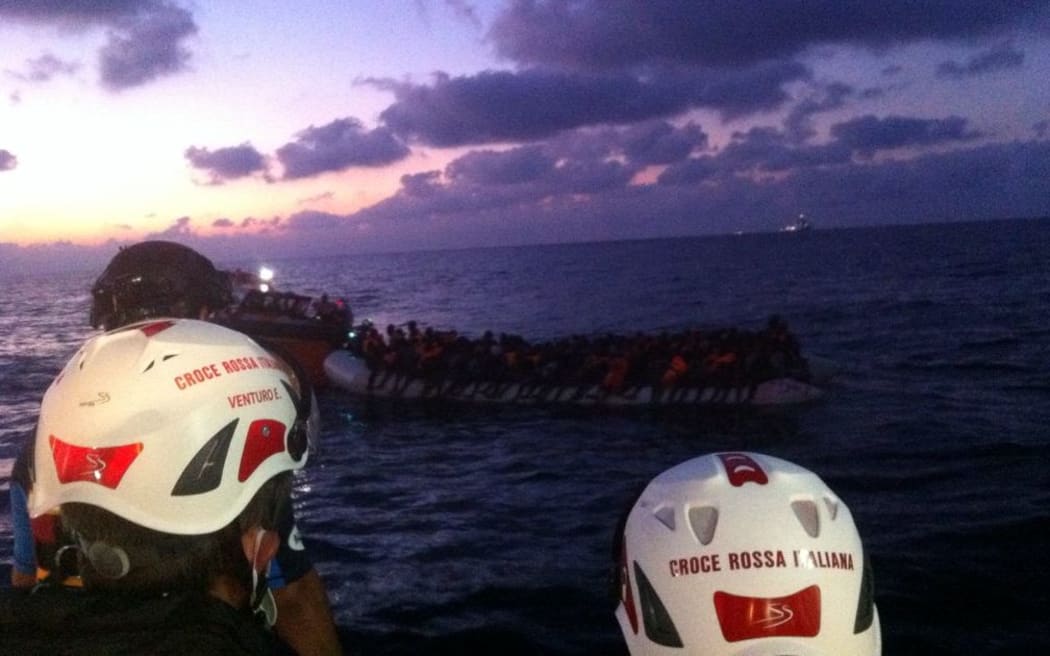
Red Cross workers spot more than 100 people on a flimsy dinghy, leaking oil. Photo: Twitter: @RosemarieNorth
It starts before dawn, with a report on the radio there's a boat in international waters about 12 nautical miles from Libya. The Responder goes looking. On board are search and rescue specialists from the UK, USA and Malta working for the independent charity Migrant Offshore Aid Station (MOAS) and a Red Cross team. MOAS does the rescuing.
Once people are on board, a team of four people from the International Federation of Red Cross takes over with medical checks and first aid, food, water and shiny insulating "space" blankets at night. I'm there to help raise funds for this work, which is expensive, and to give a human face to a crisis that can seem overwhelming.
The Responder launches one of its smaller rescue craft, the Ghalib. Its search light illuminates a sickening sight. Out of the darkness looms a big grey, inflatable dinghy. More than 100 people straddle the edges, one foot in the waves, the other inside. More people hunch in the well.
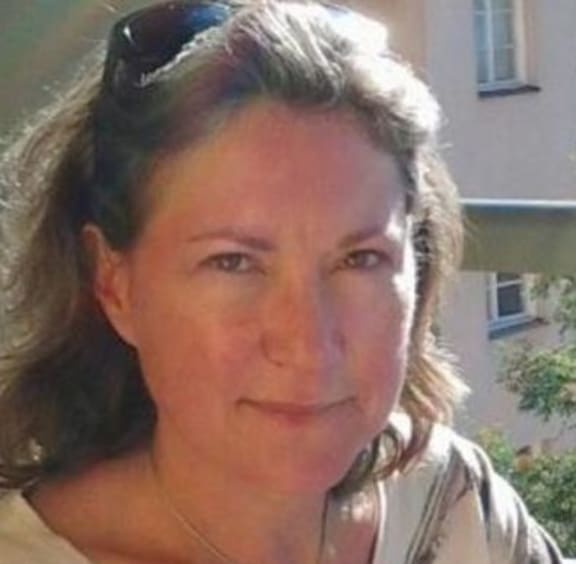
Rosemarie North says working with rescuers in the Mediterranean is different to her work in previous crisis situations. Photo: Twitter
It's a boat you wouldn't cross Wellington Harbour on with 30 people on board. Yet these people have paid huge sums to be onboard to flee conflict, or just be able to feed their families.
Their rubber boat was launched around midnight and they're frankly lucky to have made it this far. According to the UN refugee agency, 2016 is the deadliest year on this route. People on this boat are lucky to be spotted.
The rescuers on the Ghalib tell people to be calm. They begin tossing life jackets to the rubber boat passengers. Most people can't swim.
But there's a problem. There's a toxic smell. High octane fuel is leaking from the boat's engine and mixing with sea water. Passengers are inhaling it, making them intoxicated. Some of them faint.
I stand at the railing of the Responder, looking on in horror as a woman in the rubber boat holds up a tiny baby in a white bodysuit, perhaps hoping to draw attention to the boat's plight. There's panic and yelling. People tumble or jump into the water, even though they can't swim.
Our colleagues, the MOAS rescue swimmers, plunge into the sea to save as many as they can, hauling people on to the deck of the Responder. Almost instantly I find myself holding a screaming baby in each arm.
After a scramble, we count 134 survivors, including 99 men, 29 women and 6 children - including two six-month-old twins and an eight-month-old baby. Tragically, seven people lost their lives. Their bodies are taken to the morgue of the Responder.
Almost immediately, we're called to another rescue. This one is text book. We bring on board 22 passengers from another rubber boat. And then another one with 27 people. There's barely time to take a breath. It's all about saving lives.
As soon as we can, the Red Cross medical team gives people medical checks and first aid. Most people are OK. But two men with severe injuries from the toxic fuel are evacuated by the Italian Coastguard to hospital. I'm really worried about one of them. He's in agony. He inhaled so much fuel it's damaged his airway. Later, the nurse tells me she didn't think he had much of a chance.
Two days after, I find out he died in hospital.
Later, the Responder takes on board 171 passengers transferred from two other rescue ships patrolling in the area. One man is transferred to another ship to be reunited with his wife. The Maritime Rescue Coordination Centre in Rome, which coordinates the rescues and transfers, asks us to sail our 351 passengers to Italy.
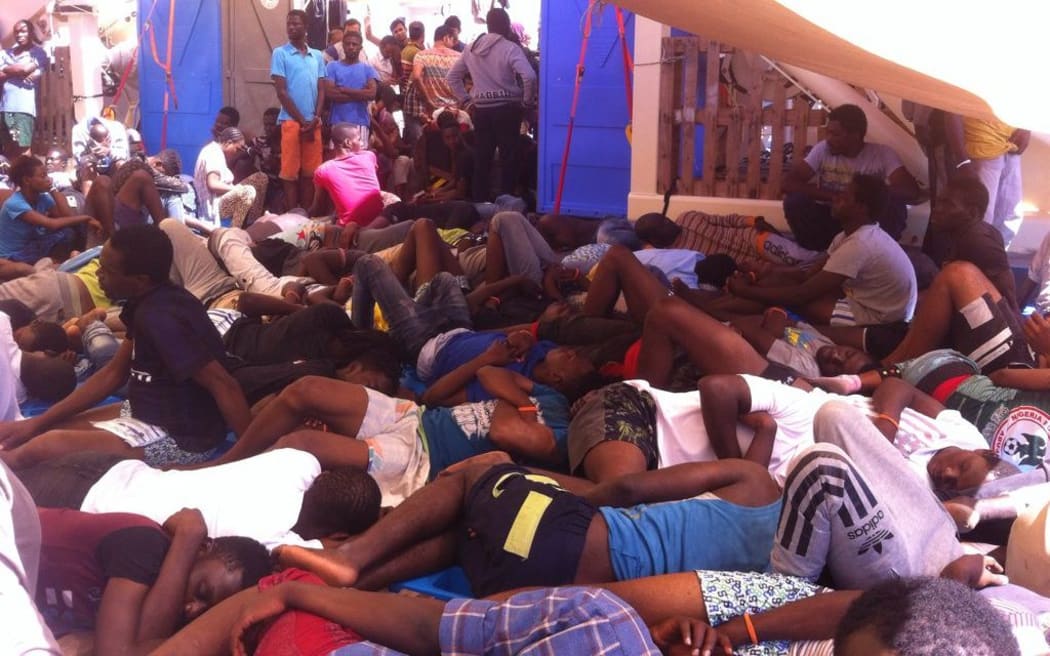
People rest in the shade on the Responder after being rescued. Photo: Twitter: @RosemarieNorth
We can't solve the political or economic conditions that create the push factors. That's a job for world leaders. But we can reduce the needless drownings.
On deck, people are churned up. They cry and wail or sit looking shocked.
Later, they start to relax. They're finally safe. Most are simply relieved to be alive.
"Going from Nigeria to Europe isn't easy, through the land and through the sea. We lost a lot of people from the boat. I could have been among them," Jamal Agboola-Muideen, a 39-year-old father of four tells me.
He's the breadwinner for his extended family and said he was forced to flee Nigeria after his parents died and he began receiving death threats from relatives who wanted their land.
I meet Bangladeshi migrant workers stuck in Libya with no pay for two years. To my shame, I cannot think of the name of a single Bangladeshi cricketer. These chaps would have been delighted.
I hold the hands of a green-eyed 22-year-old Libyan guy, anguished he couldn't do more to protect his two brothers and his mother, who were killed in front of him, and his sister, who was abducted. He thinks he has an aunt in France. The Red Cross can help him track her down.
Thumbs up to 351 rescue survivors now on dry land in Sicily. #ProtectHumanity pic.twitter.com/LFfdfDJ41f
— Rosemarie North (@RosemarieNorth) September 7, 2016
People are from Africa, the Middle East and Bangladesh. There's all sorts. Girls huddling together for warmth at night. A woman using a strip of space blanket as a turban. A guy giving his blanket to a shivering stranger. People who put their hands up to help when I trip along a lurching deck awash with water. A baby crying in distress and hunger while a demoralised mum looks away.
They ask for water, food, Wi-Fi, a coffee. We're a floating ambulance so we provide only the first two. It's meagre but soon there will be more help. The big things come first: life.
As I look around these faces on the deck, an eerie thought strikes me: if we - or other rescuers - hadn't found them, every single person here would be dead. We've given them a second chance at life.
* Rosemarie North is a New Zealander and former newspaper reporter who has been involved with the Red Cross since 2003. She has worked in Africa, Asia and the Pacific on disasters and humanitarian crises.
